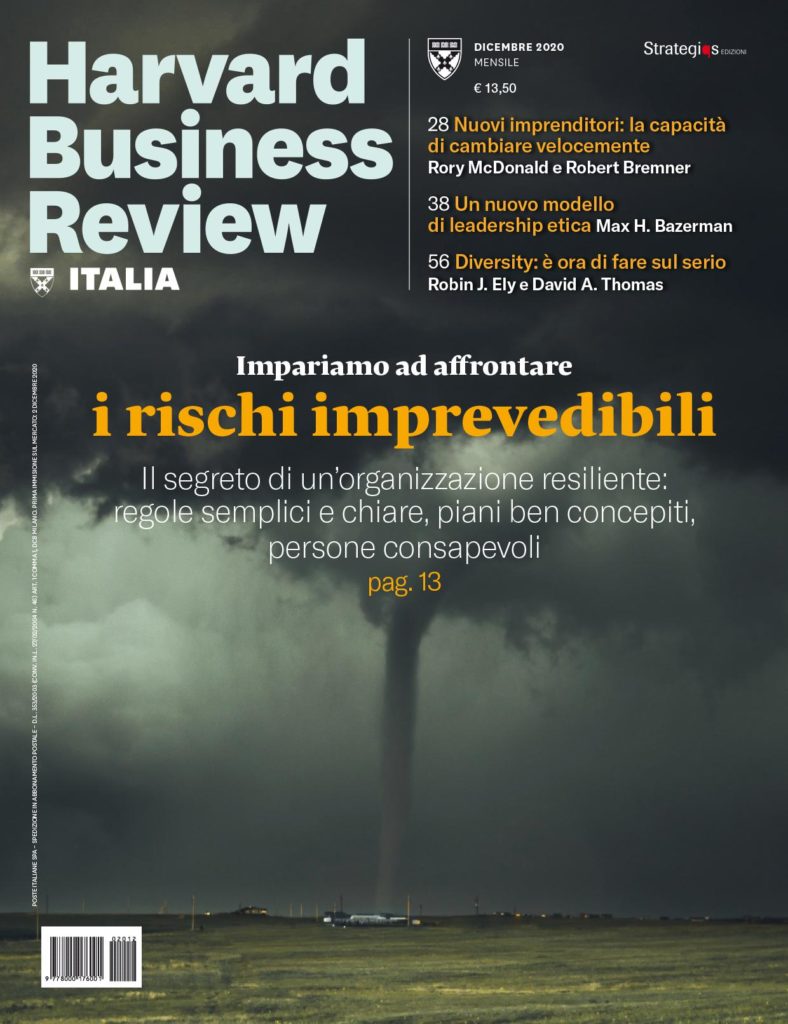
“We learn to face unpredictable risks” is the title of the December 2020 issue by Harvard Business Review Italia. We publish the editorial of the director Enrico Sassoon.
Risk is the other side of the market economy and capitalism. And profit, in the neoclassical sense, is the premium for the risks that the entrepreneur assumes. For the Marxian theory, the willingness to risk of the capitalist entrepreneur is called greed and profit is the undue subtraction of surplus value from the exploited worker.
But the risk obviously does not belong exclusively to the modern capitalist or entrepreneur. The risk exists in nature, always mother, sometimes stepmother: eruptions, earthquakes, floods, famines, grasshoppers, diseases, sometimes wild beasts. And it is inherent in innovation: with the invention of the boat, the risk of shipwreck is created at the same time, which until then did not exist. And man's desire to protect himself arises.
In historical memory, the earliest forms of risk insurance date back to Egypt 4,700 years ago: a rudimentary mutual fund for stonecutters, who risked their skin as the pharaohs prepared their way to eternity. But, like letters of credit and the bank, it is in Italy that the first real insurance companies emerge; in fact, between the fourteenth and fifteenth centuries, and of course between Florence and Genoa, the need to protect merchant ships generated the first insurance coverage. The Lloyds of London arrived only a couple of centuries later, in 1686, as a by-product of a famous London tavern, a receptacle for drunken sailors, but also for those merchants who made the empire.
In short, we should be accustomed to risk and in general by now everyone - organizations, companies, families, individuals - willy-nilly we tend to protect ourselves from foreseeable risks: fire, theft, plane, naval and land accidents, civil parties, but also espionage industrial, intellectual property theft, cyberattacks and so on. Never unpredictable risks?
Here the question becomes more complicated. Being unpredictable, they require a different mindset than the others. And today we are in the midst of some great phenomena that make us touch them firsthand. In part foreseeable but not foreseen, the global pandemic which is upsetting the world, both in human and social terms and in economic terms. And climate change, which we struggle to take measures? And what about the economic and financial crises? What about technological disruptions capable of disintegrating businesses that have been consolidated for years or decades in a few months? And digital? Are we sure we can deal with artificial intelligence, robotics or driverless cars?
The list goes on, but the essence is that we are not used to unpredictable risks and that, of course, few are ready to face them. The Special of this issue puts his finger on the sore. In this age of growing uncertainty, ambiguity and volatility, not having the tools and teams to deal with unexpected and sudden crises is the recipe for disaster, sometimes for extinction, at least for some serious trouble. Smart companies, and their leaders, must equip themselves, and quickly, starting from the assumption that change in all fields is accelerating and discontinuities are more frequent. Only the resilient organization can resist and perhaps even thrive. But the resilience it is not an innate gift, it must be built in a conscious way. The moral? The "R" factor must be taken very seriously.




